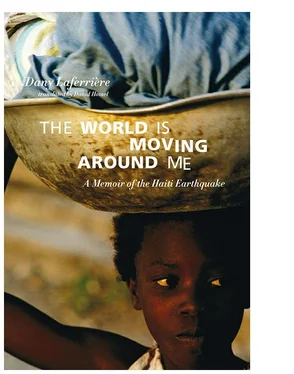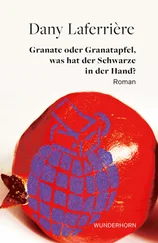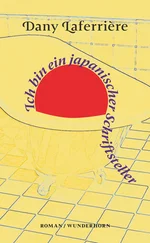Taking Stock
First thing in the morning, we get together to take stock of the situation. We can’t continue in this lethargy. We have to do something — but what? The whole city’s been through the blender. We’re in a state of shock. The planet’s eyes are riveted on Port-au-Prince. The images of destruction broadcast on a TV loop are stirring people’s energy all around the world. The radio stations that have managed to get back on the air are spitting out horror stories. The Internet works intermittently, ten minutes at a time. The phones are still down. It’s like the whole thing happened a thousand years ago. At the same time, we still haven’t assimilated how bad the situation is. Even though I saw the bodies, I go on dreaming. I didn’t describe the scenes to people who have stayed in the hotel. Figures are bandied about. It’s all so abstract: 100,000 or 200,000. Add or subtract 10,000 dead, as if each death wasn’t worthy of particular attention. All that is designed, of course, to keep you from going crazy. No one wants to be the first to go running naked down the street. We avoid considering reality, because reality is the problem.
Rumors
According to a rumor, the looting has already begun. Even in the hotel. Panic: it seems that someone has emptied the strong boxes in the rooms. In the courtyard and in front of the hotel, groups form to discuss the situation. We have to defend ourselves. We’re not going to wait to have our throats cut like goats tied to a post. Voices are raised. People are exhausted. I go off and talk to the security guards. All clear there. Then the chambermaids. They’ve seen nothing out of the ordinary. The hotel owners? First time they’ve heard of such a thing. The strong boxes are all intact. That’s how you kill a rumor before it spreads like oil on the glassy surface of a pond.
City of Calm
In the end, there never were those chaotic scenes that some journalists (but not all) no doubt wanted to see. I could just picture the front page of a major daily paper if looting really had broken out. And the televised commentaries from the instant experts about this barbarous country. Instead, people saw a dignified nation whose nerves were steady enough to resist the most terrible deprivations. When you understand that people were hungry long before the earthquake, you have to wonder how they managed to wait so calmly for help to show up. What did they live on during the month that preceded the distribution of food? And the sick who wandered the streets of the city without treatment? Despite all that, Port-au-Prince never lost its cool. We saw people standing in line, waiting for bottled water in the slums, the same districts that a few months earlier were considered danger zones where the government’s laws had no effect. So what happened? What can these changes be attributed to? Was this the shock the country was waiting for to wake up and halt its dizzying descent?We’ll have to wait a while longer to understand the true impact of such a tremendous event on the nation’s destiny. In the meantime, let’s enjoy the calm. Especially since we know that explosions of another kind (social, this time) are on the horizon.
Amos Oz
Just before I left for Haiti on January 5, when we were having dinner together, Saint-Éloi gave me a book: The Same Sea by Amos Oz. It was my first contact with a writer who has long attracted me. Since Saint-Éloi had brought his copy with him, we took out our two books to read Oz out loud. My confidence in poetry is unlimited. It alone can reconcile me with the horror of the world. Saint-Éloi read standing up. I was sitting on a suitcase. He thinks I have the same obsessions as Amos Oz: the relation with my mother, my village, and wandering. He read me these brief lines:
…My view is different. Wandering is fitting for those who have lost their way. Kiss the feet my son of the woman Maria whose womb, for an instant, returned you to mine…
I felt the small differences between us. My mother doesn’t speak; she murmurs, like a song inside her. The voice of Amos Oz’s mother seems surer. She orders him: Kiss the feet my son of the woman Maria . My mother doesn’t know the imperative. Amos Oz’s mother is a woman of passion; mine is one of gentleness.
Washing Up
Saint-Éloi goes with me. We fill a bucket of water from the pool. The bathroom is under the restaurant. No one outside of the hotel employees has ventured that far. We found two large towels near the pool. We don’t go too far inside for fear of getting trapped in that narrow room if an aftershock were to strike. We rub ourselves vigorously to remove the stain of misfortune. We dry ourselves as we converse, like a couple of athletes after a tough game. We put on clean clothes and step outside. On the tennis court, I open my suitcase and take out my razor and aftershave. People watch us, surprised at first, then they get moving too, as if awakening from a nightmare. Michel Le Bris announces that he’s going to wash his hair, and for the first time, he is willing to separate himself from his computer. He returns a few minutes later, a new man. The women bring out their lipstick. I exhibit my two mangos like war trophies. Which makes sense: when I went up to my room, I felt I was penetrating enemy territory. Someone hands me a jackknife. I offer everyone a thin slice of mango. It took an earthquake to get me to share a mango.
The Decision
That ceremony had just ended when I saw people coming up from the other side of the fence. They were officials from the Canadian Embassy searching the hotels and offering a flight out to Canadian citizens who wanted to leave. The departure to the airport was scheduled for one p.m. from the Embassy. The decision had to be made immediately. Saint-Éloi couldn’t go because he doesn’t have Canadian citizenship. I wouldn’t leave without him. I asked the officials to wait a minute. He and I went under a tree to talk it over. Stay or go — it’s always the same dilemma. After a while, I went back to the Embassy staff and said I was going with them. I’ve learned to make up my mind fast. The same way I had to decide quickly during the first seconds of the earthquake. You have ten seconds to figure out whether you’ll stay where you are or go elsewhere. That makes a difference, but I still wasn’t completely sure I’d made the right decision. I hesitated between my heart that told me to stay with these people, and my mind that told me I would be more useful for them back there. In the end, I figured that this was probably the last time someone would offer to repatriate me.
A Semantic Battle
When I heard the question that a Canadian TV journalist asked me as I was walking across the tarmac at the Port-au-Prince airport, I understood that a new qualifier had been invented for Haiti. For years, the country had been recognized as the first black republic in the world, and the second to win its independence in the Americas after the United States. Independence wasn’t handed to us over martinis, after a few hypocritical smiles and pompous speeches on a lawn littered with confetti. It was won after an armed struggle against the greatest European army at the time led by Napoleon Bonaparte. My childhood was filled with stories of slaves whose only weapon was their longing for freedom and a senseless kind of bravery. On summer evenings, my grandmother would tell me of the exploits of our heroes who had to take everything from the enemy, weapons and the art of war, for starters. Even the French language was part of “the spoils of war.” Then suddenly, toward the end of the 1980s, people started talking about Haiti only in terms of poverty and corruption. A country is never corrupt — but its ruling class can be. The three-quarters of the population that, despite endemic poverty, manage to keep their dignity should not be subjected to that insult. When outsiders talk about Haiti, those three-quarters feel concerned, and when the country is insulted, they — not the rich — feel the sting. The poorest country, no doubt, since the figures say so. But does that wipe away our history? People accuse us of dwelling on it. But no more than any other country. When a French TV network wants to fill its coffers, it airs yet another series about Napoleon. Think of the number of films and books about the history of France or England or even the Vietnam War, whereas there hasn’t been a single film about the greatest colonial war of all time, the one that allowed slaves to become citizens through sheer willpower. And now here comes a new label that is going to bury us completely: Haiti is a cursed country. Some Haitians, at the end of their rope, are even starting to believe it. You have to be really desperate to accept the contempt that others have for you. The only place to fight that label is where it germinated: in Western opinion. My sole argument: what did this country do to deserve its curse? I know a country that started two world wars in one century and proposed a final solution, and no one says it’s cursed. I know a country insensitive to human suffering, that continues to starve the planet from its powerful financial centers, and no one says it’s cursed. On the contrary: it claims to be a nation blessed by the gods — by God, more like it. So why would Haiti be cursed? I suppose some people use that label in good faith, finding no other words to name this stream of misfortune. But it’s not the right word, especially when you see the energy and dignity displayed by the nation as it faces one of the most difficult tests of our time. But each passing day makes the fight harder. All some commentator has to do is say the word “curse” on the airwaves and it spreads like a cancer. Before they can move on to voodoo, wild men, cannibalism, and a nation of blood-drinkers, they’ll see that I have enough energy to fight them.
Читать дальше












